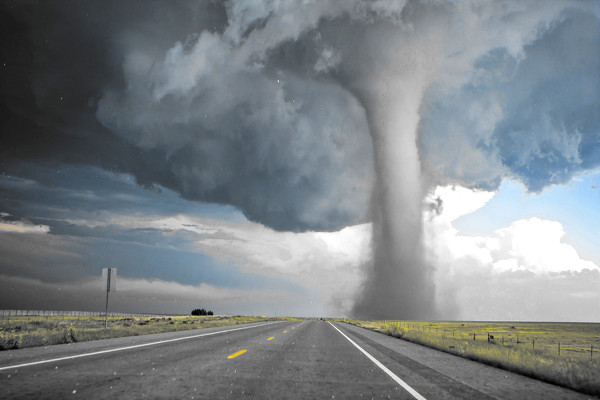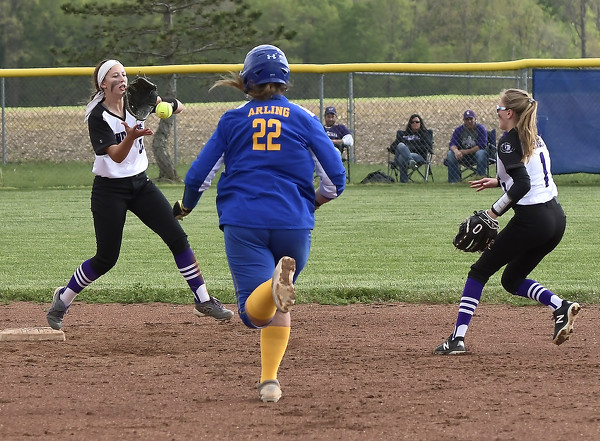
Tornado watch:
Conditions are favorable for thunderstorms capable of producing tornadoes. Be ready to go to a safe location.
Tornado Warning:
A tornado has been spotted or is expected soon. Seek shelter in a safe location immediately.
What To Do:
At home, go to a basement or interior room away from windows. At work or school follow tornado drills and go to the safe area. Outside, if sturdy shelter is unavailable lie flat in a ditch and cover your head.
CELINA - As the two-year anniversary of the Memorial Day tornado that struck Celina and other parts of Mercer County approaches, people may be thinking more about severe weather preparedness.
Fortunately, residents and Ohioans at large can take steps to protect themselves and their loved ones in the event of a tornado.
The first step in handling a tornado is to be prepared. Mercer County Emergency Management Agency director Mike Robbins said having a plan in case of an emergency is essential.
"When the tornado warning goes out is not the time to make a plan," Robbins said. "Have a plan. Where are you going to go? How will you contact people?"
Having a plan - and practicing it - are key to staying safe and prepared. Robbins said a plan should include access to a safe shelter for individuals, their families and pets.
The Centers for Disease Control and Prevention says individuals should discuss which rooms or areas would be safest for shelter, such as a basement or an inside room without windows on the lowest floor. For added protection, get under something sturdy, such as a heavy table or workbench. People also can cover themselves with a blanket, sleeping bag or mattress and protect their heads with anything available.
Robbins said people also also should be aware of safety plans at work or in a store. Those with children should learn the emergency dismissal policy for their child's school.
The American Red Cross said seniors and those with disabilities can create an emergency plan that addresses their needs by creating a personal support network of friends and/or family who can help them prepare for a disaster.
A communication plan is equally important and goes hand in hand with an emergency preparedness plan, Robbins said.
Robbins noted during the 2019 Memorial Day tornado, an AT&T phone tower went down, hindering cell phone service for many people in the area. If possible, people should have a network of family members or friends who can keep others informed and pass along messages if need be.
The 2019 Memorial Day EF3 tornado destroyed or damaged 43 homes and one business in Celina, left one person dead and resulted in millions of dollars in aid money and insurance claims.
The Red Cross has a feature called Safe and Well, a website to let loved ones know people are OK after a local disaster. Individuals can search for a family member, or people can list themselves as Safe and Well.
A designated meeting place can help people find their way back to family or know when someone is missing if they they don't show up, the CDC advises. People also should keep copies of phone numbers and addresses in their emergency kit. Since people often use their phones for both, it's important to have physical copies available in case phones die or no internet access is available.
Robbins said another essential is an emergency kit. The kit should be stocked with basic items and those that fit specific needs, such as supplies for pets or seniors.
Robbins recommended having enough food, water, medication and other supplies to last at least three days. The rule of thumb is one gallon of water per person, per day, he said.
A basic emergency kit also could include a flashlight, first-aid kit, extra batteries, cellphone with chargers and a backup battery, and a battery-powered or hand-crank radio. Another item to keep on hand is cash, which Robbins said could come in handy if ATMs are unavailable.
Keep important information such as insurance policies, medical information, birth certificates, ownership certificates, social security cards and other important documents in a fire- or water-proof safe, the CDC advises. Robbins also suggested keeping important phone numbers and addresses on a cell phone.
"An emergency preparedness kit is different for everybody," he said. "It's whatever you need, and that communication plan."
Sirens alone are not enough to be aware of imminent, severe weather. During the 2019 Memorial Day tornado, Robbins said many residents already at home didn't hear the sirens.
While helpful, tornado sirens are intended for people who are outdoors, not those already indoors, Robbins said. Officials from the National Oceanic and Atmospheric Administration agree, emphasizing outdoor sirens are meant for outdoor use. Everyone should have ways to receive warnings indoors and not depend on sirens.
With that in mind, it's crucial to have multiple avenues to receive information and warnings.
"Everybody needs two or three ways to receive weather warnings," Robbins said. "There are apps you can put on your phone, like the Red Cross app."
Along with the Red Cross, the National Weather Service also has an app for smartphone users, Robbins said. Such apps can track a user's location and send alerts even when the user is not using the app, so long as they give permission to the app to follow their location.
Another tool is a NOAA weather radio. A NOAA weather radio is a nationwide network of radio stations broadcasting continuous weather information direct from a nearby National Weather Service office, according to the organization.
After the 2019 Memorial Day tornado, officials said casualties and injuries were kept to a minimum thanks to residents' listening to warning sirens and receiving text messages from NIXLE, an emergency messaging system that sends advisories from the Mercer County Sheriff's Office.
If a tornado does hit, the safest place in the home is the interior part of a basement. If there is no basement, Robbins said people should go to an inside room, without windows, on the lowest floor. This could be a center hallway, bathroom or closet.
The least desirable place to be during a tornado is in a motor vehicle. If a person is in a vehicle and sees a tornado, they should try to seek shelter in a sturdy building, or underground if possible.
If caught by extreme winds or flying debris, people should park the car as quickly and safely as possible out of the traffic lanes, NOAA states, and stay in the car with the seat belt on. They also should put their head down below the windows and cover their head with their hands and a blanket, coat, or other cushion if possible.
If caught outdoors, people should seek shelter in a sturdy building if possible. If no building is available, NOAA says people should lie flat and face-down on low ground, protecting the back of their head with their arms and get as far away from trees and cars as possible.
Weather experts measure a tornado's power based on damage caused. Wind speeds are estimates.
Light damage
Less than 73 mph
Tree branches may be broken, shingles missing.
Moderate
73-112 mph
Mobile homes off foundations, cars blown off roads.
Considerable
113-157 mph
Roofs torn off, trees uprooted or snapped in half.
Severe
158-206 mph
Roofs and walls destroyed, cars lifted and thrown.
Devastating
207-260 mph
Homes leveled, objects become deadly missiles.
Incredible
261+ mph
Damage can be unimaginable.
